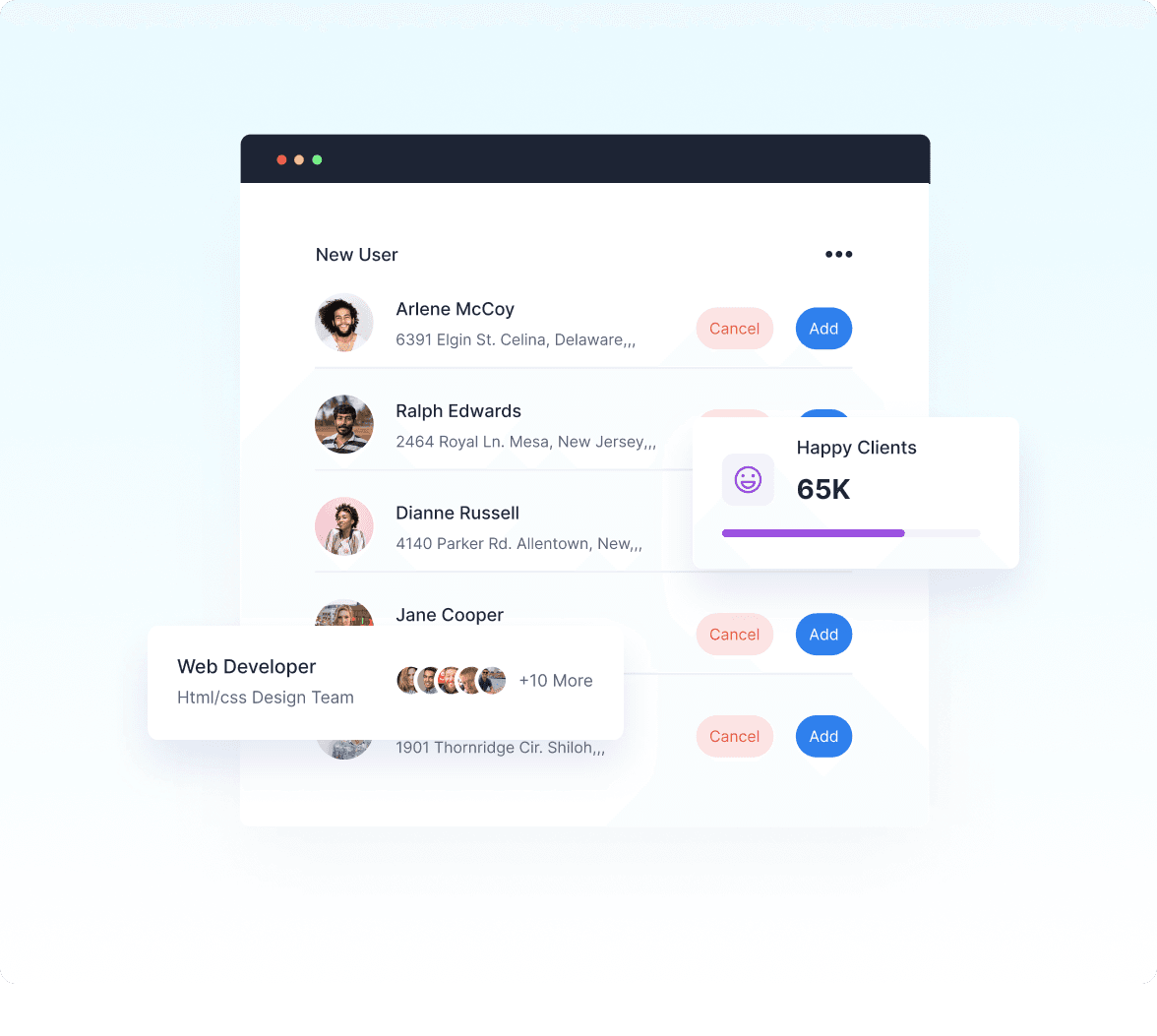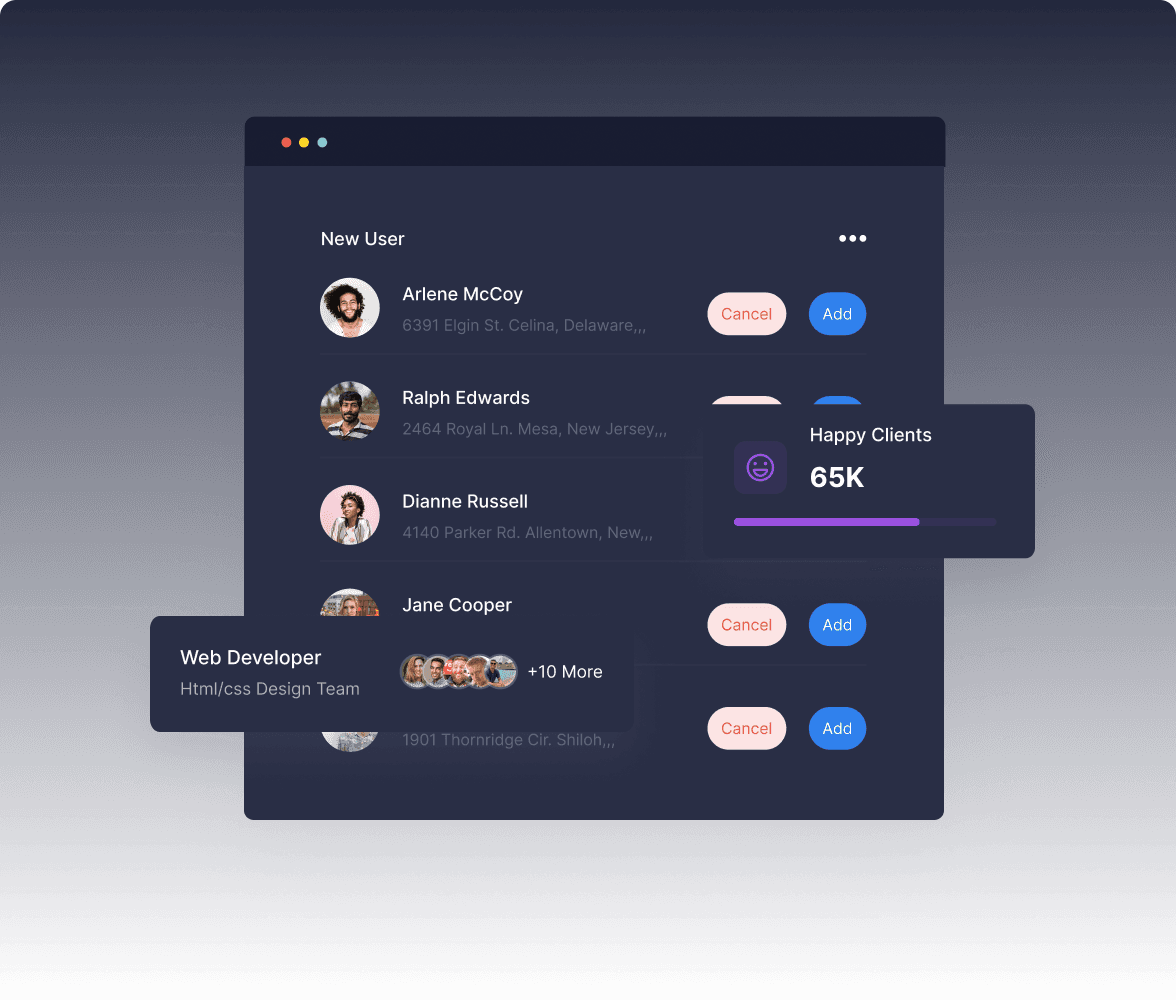🔥 Cosmo - A Complete SaaS Web Template
Free Next.js Template for SaaS
Cosmo Pro - Packed with all the key integrations you need for swift SaaS startup launch, including - Auth, Database, Sanity Blog, Essential Components, Pages and More. Built-winth - Next.js 13, React 18 and TypeScript.
Try for free no credit card required.
Core Features of Cosmo
Lorem ipsum dolor sit amet, consectetur adipiscing elit. In convallis tortor eros. Donec vitae tortor lacus. Phasellus aliquam ante in maximus.
Crafted for SaaS
Lorem ipsum dolor sit amet, consectetur adipiscing elit. In convallis tortor.
High-quality Design
Lorem ipsum dolor sit amet, consectetur adipiscing elit. In convallis tortor.
Next.js 13 + TypeScript
Lorem ipsum dolor sit amet, consectetur adipiscing elit. In convallis tortor.
Sanity Blog and Docs
Lorem ipsum dolor sit amet, consectetur adipiscing elit. In convallis tortor.
DB, Auth and Stripe
Lorem ipsum dolor sit amet, consectetur adipiscing elit. In convallis tortor.
Regular Free Updates
Lorem ipsum dolor sit amet, consectetur adipiscing elit. In convallis tortor.
A Complete Solution forSaaS Startup
Lorem ipsum dolor sit amet, consectetur adipiscing elit. Ut ultricies lacus non fermentum ultrices. Fusce consectetur le.
React 18, Next.js 13 and TypeScript
Ut ultricies lacus non fermentum ultrices.
Fully Customizable
consectetur adipiscing elit fermentum ultricies.
Launch Your SaaS Fast
Packed with All Essential Integrations
Lorem ipsum dolor sit amet, consectetur adipiscing elit. Ut ultricies lacus non fermentum ultrices. Fusce consectetur le.


Cosmo Has Neat & Clean User Interface.
Lorem ipsum dolor sit amet, consectetur adipiscing elit. Ut ultricies lacus non fermentum ultrices. Fusce consectetur le.
Nam id eleifend dui, id iaculis purus. Etiam lobortis neque nec finibus sagittis. Nulla ligula nunc egestas ut.
Ready to Use Pages You Need for a SaaS Business.
Lorem ipsum dolor sit amet, consectetur adipiscing elit. Ut ultricies lacus non fermentum ultrices. Fusce consectetur le.
Nam id eleifend dui, id iaculis purus. Etiam lobortis neque nec finibus sagittis. Nulla ligula nunc egestas ut.
Functional Blog, DB, Auth and Many More
Lorem ipsum dolor sit amet, consectetur adipiscing elit. Ut ultricies lacus non fermentum ultrices. Fusce consectetur le.
Nam id eleifend dui, id iaculis purus. Etiam lobortis neque nec finibus sagittis. Nulla ligula nunc egestas ut.



Trusted by Global Companies.
Lorem ipsum dolor sit amet, consectetur adipiscing elit. In convallis tortor eros. Donec vitae tortor lacus. Phasellus aliquam ante in maximus.
500K
World Wide Clients
1M+
Downloads
865
Winning Award
Remotely Maintain Your Data, From Anywhere, Anytime.
Lorem ipsum dolor sit amet, consectetur adipiscing elit. In convallis tortor eros. Donec vitae tortor lacus. Phasellus aliquam ante in maximus.








Join With Us Today & Increase Your Productivity
Lorem ipsum dolor sit amet, consectetur adipiscing elit. In convallis tortor eros. Donec vitae tortor lacus. Phasellus aliquam ante in maximus.


We provide digital experience services to startups and small businesses. We help our clients succeed by creating brand identities, digital experiences.
Client’s Testimonials
Lorem ipsum dolor sit amet, consectetur adipiscing elit. In convallis tortor eros. Donec vitae tortor lacus. Phasellus aliquam ante in maximus.
Simple Pricing
Lorem ipsum dolor sit amet, consectetur adipiscing elit. In convallis tortor eros. Donec vitae tortor lacus. Phasellus aliquam ante in maximus.

$10 /month
Small Pack
Lorem ipsum dolor sit amet, consec adipisicing elit.
- 300 GB Storage
- Unlimited Photos and Videos
- Exclusive Support
- Custom Branding Strategy
$59 /month
Medium Pack
Lorem ipsum dolor sit amet, consec adipisicing elit.
- 300 GB Storage
- Unlimited Photos and Videos
- Exclusive Support
- Custom Branding Strategy
$189 /month
Large Pack
Lorem ipsum dolor sit amet, consec adipisicing elit.
- 300 GB Storage
- Unlimited Photos and Videos
- Exclusive Support
- Custom Branding Strategy
Latest News & Blogs
Lorem ipsum dolor sit amet, consectetur adipiscing elit. In convallis tortor eros. Donec vitae tortor lacus. Phasellus aliquam ante in maximus.

Free advertising for your online busines...
Lorem ipsum dolor sit amet, consectetur adipiscing elit convallis tortor.

9 simple ways to improve your design ski...
Lorem ipsum dolor sit amet, consectetur adipiscing elit convallis tortor.

Tips to quickly improve your coding spee...
Lorem ipsum dolor sit amet, consectetur adipiscing elit convallis tortor.

























